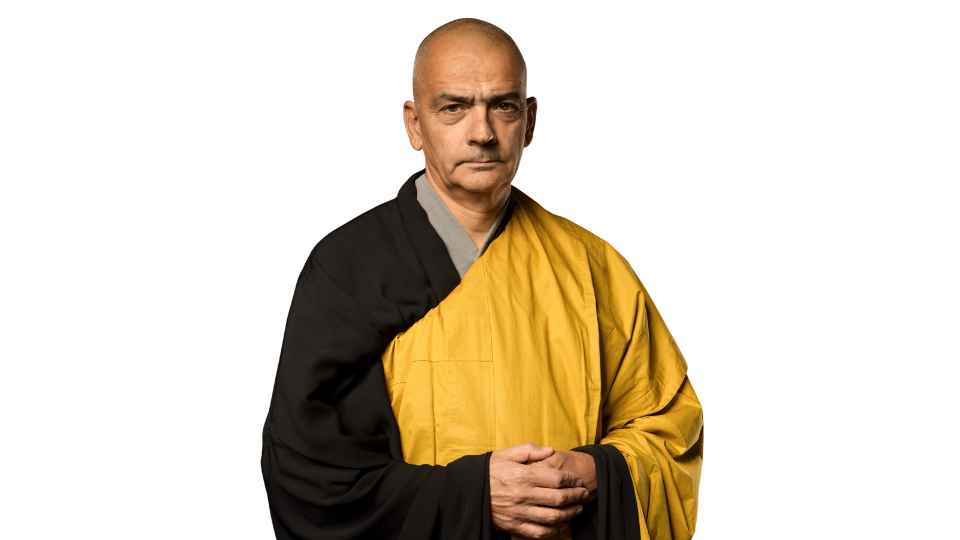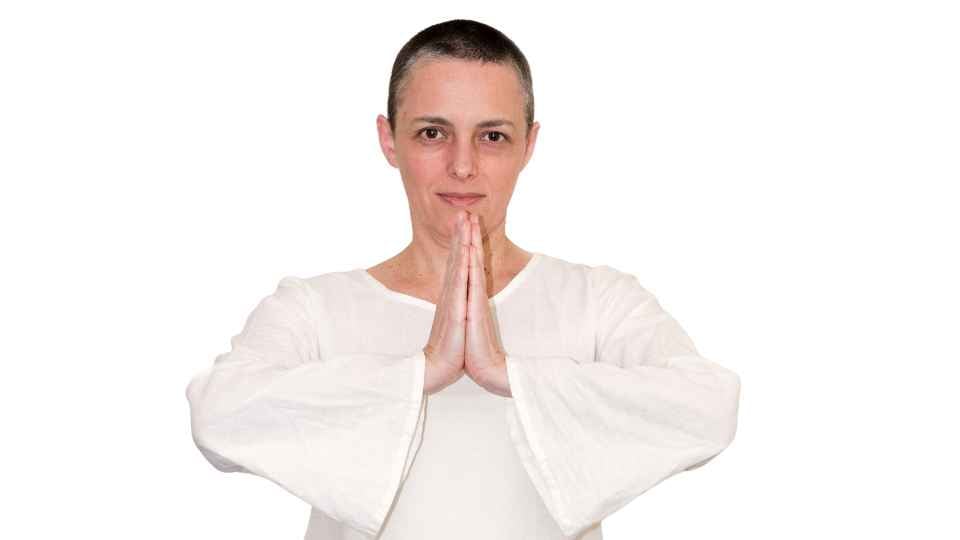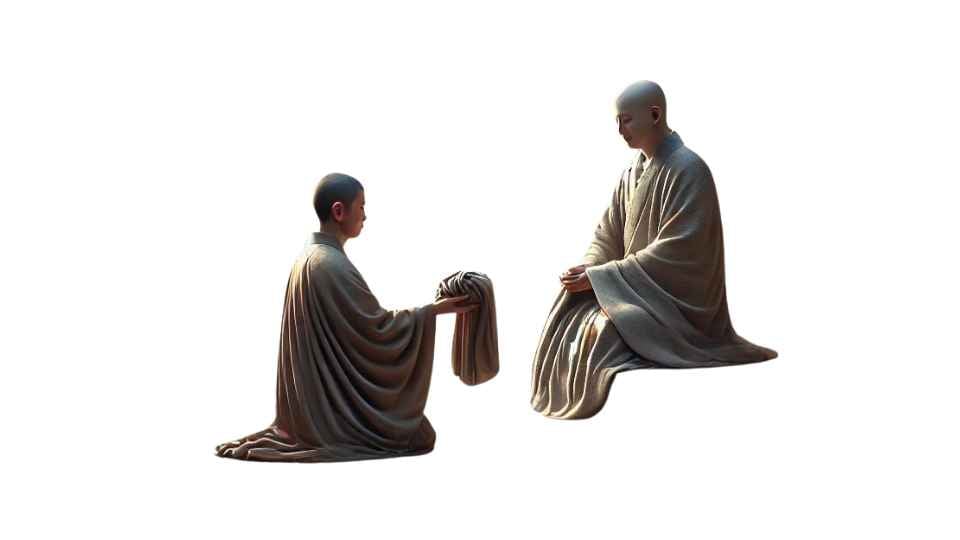Roland Yuno Rech, Zen Master
Roland Yuno Rech, born in 1944, graduated from the Paris Institute of Political Studies and…
In Zen master Lluís Nansen Salas (Barcelona, 1965), two aspects that are often considered antagonistic come together: science and spirituality. With a degree in Theoretical Physics from UAB, he began practicing Zen in 1991. In 1995, he was ordained as a Zen monk by Raphael Doko Triet, in the lineage of Master Taisen Deshimaru.
In 2003, he became a disciple of Roland Yuno Rech, from whom he received the Dharma Transmission, the shiho, in 2016. His scientific background, along with his trust in personal experience, enables him to teach the Dharma with objectivity and empiricism, making it easy for the Western practitioner to understand, as he addresses the most profound spiritual questions without taboos or prejudices.
In 2008, Master Lluís Nansen, together with Natàlia Keiko and a group of practitioners, founded the Dojo Zen Barcelona Kannon association. This Zen center was located on Ronda Universitat in Barcelona from 2009 to 2022.
In 2002, with the aforementioned Zen Kannon Community, he founded the Great Way Zen Temple in the city of Barcelona. Lluís Nansen bases his teaching on a solid practice of seated meditation, zazen. Once meditation is harmonized with our daily lives, the practice of mindfulness in everyday life naturally follows.
Lluís Nansen offers courses in Zen meditation, Zen mindfulness, Buddhist philosophy, and leads Zen retreats (sesshin).

2019. Dharma zen : el ojo de la maravillosa revelación. Primera edición. Barcelona: Ediciones Invisibles. ISBN 9788494898761.
2019. La Mente del despertar : enseñanzas Zen en Llucà. Primera edición. Barcelona: Zen Kannon. ISBN 9788409141708.
2018. Mindfulness zen : la consciencia del ahora. Primera edición. Barcelona: Ediciones Invisibles. ISBN 9788494707063.
2017. Meditación zen : el arte de simplemente ser. Primera edición. Barcelona: Ediciones Invisibles. ISBN 9788494707018.
See all the books published by Lluís Nansen Salas
Natàlia Keiko Barenys (Barcelona, 1966) is a Zen master. She holds a degree in Art History from UAB and a postgraduate degree in Documentation. Keiko started the practice of Zen In 1993 and some years later, in 1997, she received the zen nun ordination. From the beginning, she has steadily deepened her Zen practice, leading to a complete fusion with daily life in a continuous gyoji.
Natàlia Keiko received Dharma transmission from Lluís Nansen Salas in 2018, becoming the first Soto Zen master in Catalonia. Her teaching is based on the direct transmission of practice from mind to mind.
As the general secretary of the Zen Kannon Community, Natàlia Keiko is both a teacher and manager of the Great Way Zen Temple.

DESHIMARU, T. y BARENYS, N., 2005. Preguntes a un mestre zen. Barcelona: Pagès. ISBN 8497792351.
DESHIMARU, T. y BARENYS, N., 2003. La Pràctica del zen. Barcelona: Publicacions de l’Abadia de Montserrat. ISBN 8484154564.
RYŌKAN y BARENYS, N., 2001. Gota de rosada en una fulla de lotus. Lleida: Pagès. ISBN 8479358289.
See all translations of Natàlia Keiko Barenys
Dharma transmission is a fundamental concept in Zen Buddhism, particularly in the Sōtō school, representing the direct and personal transfer of Buddhist teachings from master to disciple. This transmission is considered an expression of the continuity of the lineage that traces directly back to Buddha Shakyamuni. It is not merely the transmission of knowledge but a profound and living experience symbolizing the understanding of the true meaning of the Dharma.
According to Zen tradition, this transmission dates back to an experience between Buddha Shakyamuni and his disciple Mahakashyapa. During a sermon, the Buddha silently held up a flower before his disciples, and only Mahakashyapa subtly smiled, recognizing the teaching without words. This “outside the scriptures” transmission, known as the direct transmission from mind to mind, is the foundation of Zen’s lineage.
This school emphasizes the transmission of the practice of zazen (seated meditation) as the core of the Dharma. According to this tradition, the teaching is not necessarily conveyed through texts or explanations but through the shared experience of zazen between master and disciple. This transmission is formalized when the master considers that the disciple has experienced the direct understanding of Buddha-nature.

The Dharma transmission process is surrounded by great solemnity and symbolism. In Zen schools, one of the most significant rituals is the formal transmission of the kesa, the traditional robe of the Buddhist monk. When a master transmits the Dharma to a disciple, this ritual often involves the handing over of this robe as a symbol of the continuity of the lineage.
Another important element is the delivery of the Dharma transmission certificate, a written document that testifies that the disciple has received the direct teaching and has been recognized as the master’s successor within the Zen lineage.
Dharma transmission is a crucial moment in the life of a Zen practitioner, as it symbolizes the recognition of their deep understanding of Zen and their ability to guide others on the path. This transmission, beyond words and concepts, is at the heart of Zen and represents the intimate relationship between master and disciple, keeping the flame of the Dharma alive for future generations.
The lineage of Dharma transmission is the unbroken chain of Zen masters who have directly transmitted the teachings and understanding of the Dharma from master to disciple, from Buddha Shakyamuni, through Bodhidharma in the 6th century, Dogen in the 13th century, the most recent masters of the 20th century, up to the masters of our community, Lluís Nansen and Natàlia Keiko.
This transmission represents the continuity of the experience and wisdom of awakening, passing from one generation to the next, ensuring the preservation of authentic practice within Zen Buddhism.
Roland Yuno Rech, born in 1944, graduated from the Paris Institute of Political Studies and…
Born in Saga in 1914, Taisen Deshimaru was a disciple of Master Kodo Sawaki, one…
Kodo Sawaki (1880-1965) was an influential Japanese Zen master, known for revitalizing the practice of…
In the history of Zen, there have been especially brilliant masters. One of them is…
Zen Master Dogen (1200-1253) is one of the most influential figures in Japanese Buddhism, particularly…
Bodhidharma, often considered the 28th Indian master of Zen and the 1st Chinese master, is…